
 Anyone familiar with the Porchlight Music Theatre knows that its Artistic Director, Michael Weber, is not only a director, he is in fact, an interpreter. He is known to delve into each project as a scientist might seeking a cure for a major disease. One can see that he has studied the “Cabaret” musical as well as the books that the story is based on and perhaps, maybe, even the historical times when this all took place.
Anyone familiar with the Porchlight Music Theatre knows that its Artistic Director, Michael Weber, is not only a director, he is in fact, an interpreter. He is known to delve into each project as a scientist might seeking a cure for a major disease. One can see that he has studied the “Cabaret” musical as well as the books that the story is based on and perhaps, maybe, even the historical times when this all took place.
While I have been witness to probably 25 productions of this play as well as “I Am A Camera” on many occasions, and was going to take a “pass” allowing Julia to be the reviewer, when my friend Paul sent me his review ( in hopes that I would post it), I said to Jane, we are going and I want to do a review as well. So, dear readers- be prepared for three views from different writers on this production. I always tell my readers and listeners that a live play can seem different each time you see it and that a different stage, director, cast and set can make a difference. A different reviewer can also make a difference.
Those of us who are familiar with Weber know that he is very intense and interprets each piece to the nth degree. His choreographer, Brenda Didier constantly proves that her style and steps are her own and like a Bob Fosse, Didier has moves that are her trademark. This being said, below you will find the reviews- please note that each of us have our own thoughts and ideas. I for one see a ton of nominations by the Jeff Committee.
Alan Bresloff:
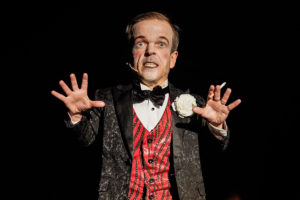 [rating=5]Porchlight Music Theatre’s “Cabaret” is an outstanding piece of work. This amazing musical based on the book “I Am A Camera” by John Van Druten and Christopher Isherwood’s “Goodbye to Berlin” is unique in every way. Director Michael Weber has assembled a cast that is different than the standard “look” one might expect, but each and every character is portrayed to perfection. The choreography by Brenda Didier is wonderful and while we don’t expect a big line/kick number, she manages to bring them to us with style and grace.
[rating=5]Porchlight Music Theatre’s “Cabaret” is an outstanding piece of work. This amazing musical based on the book “I Am A Camera” by John Van Druten and Christopher Isherwood’s “Goodbye to Berlin” is unique in every way. Director Michael Weber has assembled a cast that is different than the standard “look” one might expect, but each and every character is portrayed to perfection. The choreography by Brenda Didier is wonderful and while we don’t expect a big line/kick number, she manages to bring them to us with style and grace.
Pay close attention to the start. It is “The Kit Kat Klub” years after the war and Clifford is taking photos of where it all took place. During his “photo shoot” suddenly the Emcee appears out of the trash, broken and decrepit and begins ‘WillKommen”. And then….
It is Berlin in the late 1920’s heading into the 30’s. Our main character, Clifford Bradshaw ( a powerful performance by Gilbert Domally), an American, is in Berlin to write his novel. On the train he meets a German, Ernst Ludwig (Josiah Haugen) who helps him find his way. Later, we will find that Ernst is a member of the Nazi party. Clifford is an unusual character and while most renditions of the show indicate his bi-sexuality , Weber truly shows us the true character. This is a gutsy move, but well directed and acted making it feel comfortable for audience members to absorb and understand.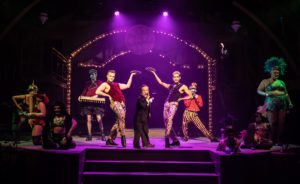
Clifford is introduced to the Kit Kat Klub where he meets a little bit of everything that Berlin had to offer at the time. There is a character, The Emcee at the club that most of the world associated with Joel Grey who did the Broadway production and the film version. Weber, in doing his research, found that the character is referred to as the “little man” so he opted to play it that way, bringing in the spectacular Josh Walker to play this role. There is an old saying that “good things often come in small packages”. Walker proves that to the nth degree! He is powerful, dances a storm, plays off the audience ( we sat in the first row) and is a definite Jeff nominee.
He also meets one Sally Bowles ( Erica Stephan will knock your sox off and you will find yourself saying , “Liza” Who ?). One thing I have learned about this theater company- they find talent ! Stephan is a name to remember because you will be seeing a great deal more of her, I am sure.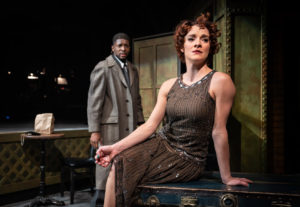
The old love story between the landlady, Fraulein Schneider ((Mary Robin Roth) and the fruit stand owner, Herr Schultz ( the always reliable Mark David Kaplan) is a delight to watch unfold. Of course, she is German and he is a German Jew, so when things start to sway, they can no longer co-exist.
The ensemble is very important to this show working. The “boys” and “girls” must be performers and take on other roles and do so with ease. They sing, they dance, they act , they do quick changes and even help change the scenery when need be.
Neala Barron, Jordan Beyeler, Anna Brockman ,Morgan DiFonzo, Julia Fleckenstein, Tim Foszcz, Haley Gustafson, Natalie Henry, Darren Patin, Shane Roberie, Cam Turner, Shaun White and Evan Wilhelm- BRAVO!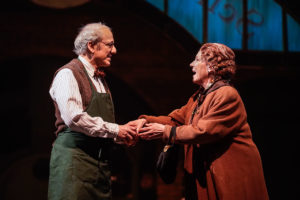
The orchestra (conducted by Linda Madonia) is wonderful . Each Kander and Ebb song is used to move the story from point A to point Z. The set (designed by Angela Weber Miller) truly worked from all angles of the theater. The sound (Matthew R. Chase) and lighting (Patrick Chan) were sheer perfection and the costumes (Bill Morey) quite fitting ( that is a reviewer joke).
“Cabaret” will continue at the Ruth Page Center for the Arts located at 1016 N. Dearborn Street thru MARCH 19th with performances as follows:
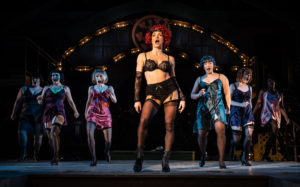 Thursday, January 26th 7:30 p.m. and February 2nd at 1:30 p.m.
Thursday, January 26th 7:30 p.m. and February 2nd at 1:30 p.m.
Fridays 8 p.m.
Saturdays 3:30 and 8 p.m. Open Caption on 1/28 and 2/4 afternoon performances
Sundays 2 p.m. except for 2/12 closing, 6:30 p.m.
Tickets start at $25 and can be purchased by visiting www.PorchlightMusicTheatre.org
To see what others are saying, visit www.theatreinchicago.com, go to Review Round-Up and click at “Cabaret”.
3-1/2 stars – bumped up to 4 stars! Review by Julia W. Rath
Porchlight Theatre’s “Cabaret” is fun and entertaining yet retains its dark underpinnings of things to come: having to do with the Nazis’ rise to power in Germany in the 1930s. With hummable music by Kander and Ebb and a remarkable book by Joe Masteroff, the singing, dancing, and acting in this show are terrific—and many elements are exceptional. Having seen other productions before, I felt that this one needed to show more of how ghastly the Nazis were to those whom they categorized as being their enemies. Showing the symbol of the swastika (and assuming that theatregoers know what this means) is simply not good enough in this day and age. As the generation who actually lived through World War II passes away and their collective memory fades into history, it is important to remember what these people went through and to realize that right-wing extremism can rear its ugly head anywhere. In that vein, “Cabaret” makes important points about how a society can descend politically and culturally into one where hate and violence rule and where racism, anti-Semitism, and homophobia become normative.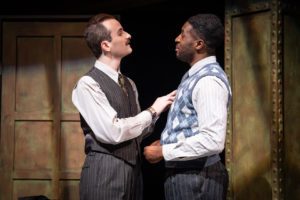
Despite several shortcomings in this production, the onset is very powerful. Director Michael Weber initially explains how the recollections of American journalist Christopher Isherwood made their way to the precursor of “Cabaret”: a 1951 Broadway play called “I Am a Camera.” Based on that show, today’s performance opens with Clifford Bradshaw (Gilbert Domally) returning to Germany well after the end of World War II, taking flash photos of the former Kit Kat Klub. The once-glamorous nightclub is now a heap of rubble, brought to the ground by bombardment but is still identifiable. Next, we see the emcee (Josh Walker) come forward with his Victrola, playing a record of the signature song “Willkommen” from back in the day. The first thought that entered my mind is that the emcee lived through the war. Considering how many people had died or had been sent to concentration camps and did not survive, this was a hopeful sign.
The story is told in flashback. The year 1951 morphs into 1929, when the history of the club merges with Cliff’s personal history when he first arrives in Berlin. We see how he meets Ernst Ludwig (Josiah Haugen) on the train and how they become fast friends. We witness the marvelous singing, dancing, and gyrations of British performer Sally Bowles (Erica Stephan) and how she and Cliff start a relationship together. At the same time, Cliff expresses some same-sex interests in the person of Bobby (Shaun White). But perhaps the most intriguing part of the presentation has to do with the cabaret venue itself. The showstoppers charm the audience, especially whenever the character of the emcee takes the stage. Short in stature but mighty in voice and exuberance, Josh Walker is amazing! His vivacity holds the whole story together!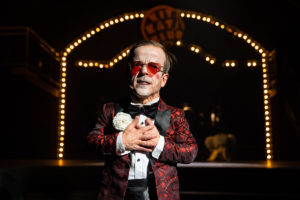
In this production, casting an African American actor to play the part of Cliff is an interesting twist that seems okay in the first act. In 1929, European nations largely accepted black people within their societies (in contrast to segregationism and Jim Crow that plagued the United States). Most Europeans were also more likely than most Americans to accept an interracial couple, such as Cliff and Sally. But once the banks fail and bad economic times befall the Germans and the Nazis take power in 1933, the Cliff character seems miscast. In the show, we see him reading Hitler’s “Mein Kampf” in his room. Suddenly his good friend Ernst openly wears a swastika and is making remarks about Jews not being true Germans. So why would Ernst want to remain friends with a black man, given the Nazi Party’s ideas about racial superiority and inferiority? This makes no sense. (Think about Jesse Owens and Ralph Metcalfe, who won medals in track and field at the 1936 Berlin Olympics, and how angry Adolf Hitler was that his prized white Aryans lost to these two black men. But I digress.)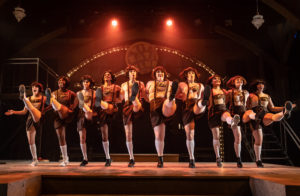
If we, in the audience, are supposed to be colorblind with regard to viewing cast members in this show, then we lose any special (and important) meaning of having Cliff be an African American traveling in Europe during this time period. But if the audience is supposed to make note that Cliff is a black man, then the second act of “Cabaret” doesn’t work as it should. Even if Cliff isn’t German, he would have been shunned by those who believe he shouldn’t be fraternizing with a white woman. Having a black character living the life of a (white) American in Germany in the Nazi era would mean that his life is endangered in more ways than one. And if that’s the case, then his girlfriend and his friends should care about his well-being and tell him to get out of the country quickly. That would entail the script having to be significantly rewritten. It is not enough to witness Cliff being beat up by several Nazis, nor is it sufficient to witness Fraulein Schneider (Mary Robin Roth) being put under public pressure to cancel her marriage to Herr Schultz (Mark David Kaplan) because he was Jewish. The audience needs to observe anti-gay and anti-Semitic attacks within the cabaret setting too. I wanted to see the Jewish dancer lose her job or have an accident, or have some of the gay men beat up, or have the emcee being given the “choice” to change his sexual orientation. I was waiting for more overt prejudice to come out and more physical violence to occur, not just implied discrimination.
Choreography by Brenda Didier is nicely sexually suggestive, vibrant, and delightful. Dialect coach Kathy Logelin has done a fine job in getting the characters to speak with German accents. Costumes worn by the cabaret dancers are alluring and perfectly appropriate, thanks to costume designer Bill Morey. I liked seeing the same sexy dress worn by Sally Bowles and the emcee, not to mention the various wigs that Sally and the ensemble wore throughout. The long faces and red noses worn by the ensemble accompanying the song “Mein Herr” are especially funny. Projection design in this show is great due to the efforts of Smooch Medina. It is wonderful to see the train station and the cabaret in 1951 and how the clock is rolled back to 1929, and also how the setting becomes Herr Schultz’s grocery store, etc. Sound design by Matthew R. Chase is well done. The lighting design, however, could have been more dramatic. For example, the lighting during many of the cabaret scenes could have been more imaginative than a lot of rotating white bulbs. The green lights coming up from the bottom of the stage towards the end are not flattering to the dancers. Music director Linda Madonia carefully leads the orchestra, consisting of Cara Strauss (reeds), Alison Tatum (violin), Greg Strauss (trumpet), Stephanie Lebens (trombone), Jake Saleh (bass) and Justin Kono (drums).
In this performance, the musicians are located behind a black scrim at the back of the stage, made to look like the front of a moving train, steaming towards the audience. Symbolic, yes! But this means that everything that occurs on stage has a black background: even the fanfare surrounding the live stage shows. In my opinion, Angela Weber Miller’s set needs more artistry and ought to be redesigned. The series of round tables directly in front of the first row is unnecessary. And with the way things are set up, much of the action having to do with Cliff’s personal life takes place on the periphery of the stage. The floating door props are interesting and often amusing, but they get tiring, especially when we can view the actors before they advance toward us.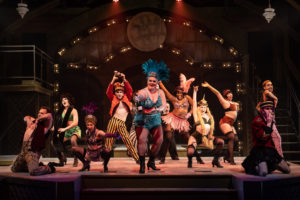
In a society becoming increasingly more intolerant by the minute, the Kit Kat Klub remains a sanctuary from the outside world. Even when the characters ultimately realize the inevitability of their demise—whether it has to do with the destruction of their lifestyle or even life itself—they dismiss it at first or don’t want to believe it until it is much too late. This is where Cliff offers us a unique perspective: As a black man in America, he has seen racism and hatred front row center and knows that things are going downhill in Germany. He can’t wait to return to his home country, despite its ills.
This leads me to discuss one of the most poignant scenes in the show, having to do with the song “Tomorrow Belongs to Me.” The first time it is sung, we see Aryan faces and culture being promoted in one of the cabaret acts. What was not lost on me was the invention of the character of the Statue of Liberty, holding her torch, and its implicit reference to today’s United States. As recently shown in the Ken Burns documentary “The U.S. and the Holocaust”, the statue was just as much a symbol of the freedom that America offered to those seeking refuge on our shores as it was a sign that certain immigrants were not welcome: with people from Northern European cultures being favored over others.
If you’re already familiar with Germany in the 1930s, the implicit parallels between that era and our own cannot be overstated. The revival of “Cabaret” comes at a very uneasy time in the history of America, with the spread of white supremacist movements and paramilitary organizations. Let’s think of this production as a warning of what could happen when the politics of hate and violence are allowed to triumph over democratic action and cultural pluralism.
“Cabaret” is playing through March 19th, 2023, at the Ruth Page Center for the Arts, 1016 N. Dearborn Street, Chicago.
Tickets start at $25.
Performance Schedule:
Friday, January 20 at 8 p.m.
Saturday, January 21 at 3:30 p.m.
Sunday, January 22 at 2 p.m.
Thursday, January 26 at 7:30 p.m.
Friday, January 27 at 8 p.m. (Post-Show Talk Back)
Saturday, January 28 at 3:30 p.m. (Open Caption Performance)
Saturday, January 28 at 8 p.m.
Sunday, January 29 at 2 p.m.
Thursday, February 2 at 1:30 p.m. (Post-Show Talk Back)
Friday, February 3 at 8 p.m.
Saturday, February 4 at 3:30 p.m. (Open Caption Performance)
Saturday, February 4 at 8 p.m.
Sunday, February 5 at 2 p.m.
Friday, February 10 at 8 p.m.
Saturday, February 11 at 3:30 p.m.
Saturday, February 11 at 8 p.m.
Sunday, February 12 at 2 p.m.
Sunday, February 12 at 6:30 p.m.
For more information about the show, to see a calendar with all the performance dates and times listed, and to purchase tickets, visit https://porchlightmusictheatre.org/cabaret/ or call the box office at 773-777-9884.
For general information about Porchlight Music Theatre and for a list of their other offerings, go to: https://porchlightmusictheatre.org/.
For the latest information on COVID protocols, visit: https://porchlightmusictheatre.org/visit/#covid-19-health-safety. Masks are currently being required for all audience members unless you are actively eating or drinking. Proof of vaccination is no longer being required. For questions, phone: 773-777-9884 or email the boxoffice@porchlightmusictheatre.org.
Paul Lisnek:
If you think you’ve seen Cabaret, I’d suggest that you have not until you see Porchlight Music Theatre’s current production. I’m not sure if it’s because of the times in which we live where anti-Semitism is rearing its ugly head, but the word that rings in my head as the most descriptive of the production is….Haunting
Yes, the show is powerful and as always presents the powerful voices, music and choreography I always expect from a Porchlight production. While diverse and unconventional casting is routine these days, in this production, diversity also rings as a strong rebuke to the pain and horror caused by the Nazis which we see stirring in Cabaret in its beginnings.
Songs such as Tomorrow Belongs to Me (a Nazi youth anthem in the show) have been re-interpreted. In the case of Tomorrow, it eases the horror of watching Nazi youth through alternative but appropriate costuming to preceding ancient times, but that doesn’t mean there are not moments of shock and some gut punches which come at moments which would otherwise be prime for applause…yet in this production, give the audience hesitation, uncertainty and pause in how to react. I struggled with my desire to show my appreciation for the incredible performance, while simultaneously feeling like my core beliefs would not let me go forward. For example, the dance steps to tomorrow belongs during the wedding engagement scene creates a visual and powerfully auditory presence of Nazism that is both unexpected and disturbing, but powerful.
The cast is universally stellar…ensemble members with a shout out to Shaun White trigger emotion thru their facial expression and movement. It’s more proof that the impact of productions relies heavily on the work and talent of the entire cast.
Bravo to Erica Stephan as Sally, Gilbert Domally as Cliff and Josh Walker as the Emcee; they do not emulate or re-create the well known performances we have come to know from the classic 1972 film; they truly reinterpret and make these roles their own. And I would be remiss without a special shout out to Mary Robin Roth, who as Fraulein Schneider takes a role often seen as secondary and transforms the character into mesmerizing show stealing (in a good way) powerhouse moments.
Sometimes the work of the director can go unnoticed. But not in this production. The strong fingerprint, guidance and influence of the direction by PMT Artistic Director Michael Weber with associate direction and often stunning choreography of Brenda Didier deserve to be acknowledged and recognized for triggering all of the emotion which fills the audience.
This production is not to be missed…it will most certainly stay with you for some time to come…and perhaps especially so these days every time you pick up a newspaper and read of some other anti-Semitic event in our society highlighting just how easy it is for one to hate…Cabaret reminds us what can happen if we don’t put a stop to it early on. If only we had in 1930…..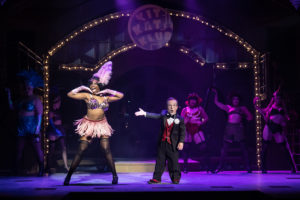
 Paul Lisnek, “Behind the Curtain” WGNRadio.com
Paul Lisnek, “Behind the Curtain” WGNRadio.com
“Cabaret” will play at The Ruth Page Center For The Arts , located at 1016 N. Dearborn thru March 19th
Purchase tickets , go to www.porchlightmusictheatre.org
Editor note: Three people- seeing the same production, each seeing something just a little different and yet all three felt the production a “must see” The political side of the story is a bit scary as we see that even 90 years later, there are people who feel the way that the Germans did in the story. Porchlight Music Theatre’s production is powerful, educational and entertaining.
To see what others are saying, visit www.theatreinchicago.com, go to Review Round-Up and click at “Cabaret”.

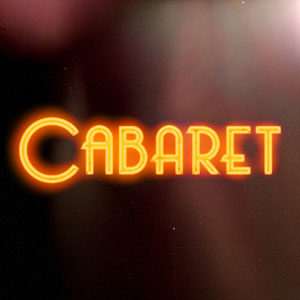 ★★★★★
★★★★★


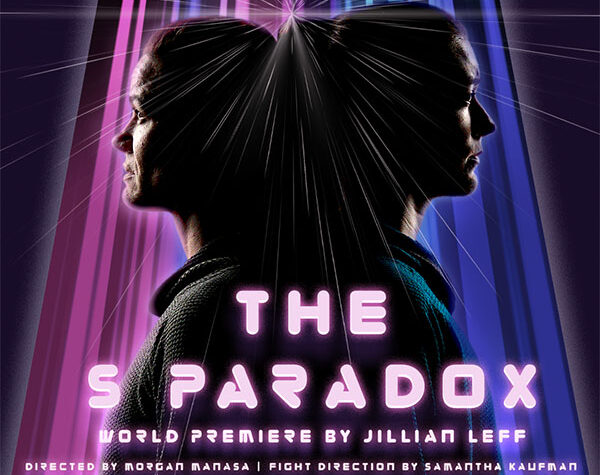
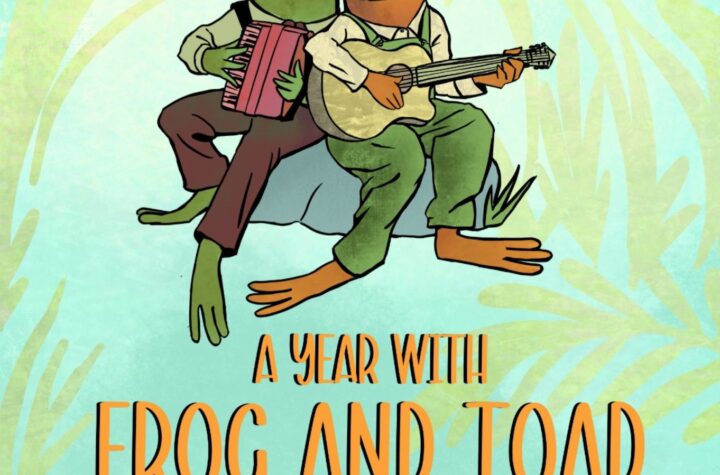
More Stories
“The S Paradox” reviewed by Julia W. Rath
“A Year With Frog and Toad”
” Monsieur Chopin” a play with music